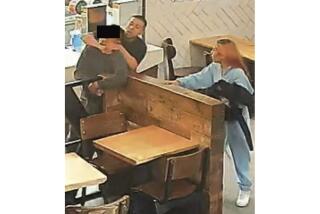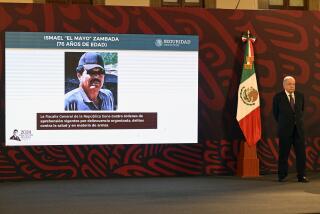Questionable Zeal
If a foreign government were to hold a prominent U.S. citizen in its jails for more than a month without filing charges, and with no possibility of bail, it would provoke anger in this country. Yet that is what the U.S. government did to Ruben Zuno Arce, the brother-in-law of former Mexican President Luis Echeverria.
Zuno Arce was arrested in San Antonio on Aug. 9 after an airport customs inspector found his name on a list of suspected drug traffickers. The Drug Enforcement Administration wanted to question him in connection with the 1985 murder of DEA agent Enrique Camarena. U.S. officials say Zuno Arce sold the Guadalajara house where Camarena was tortured and killed by Mexican drug traffickers only a month before the murder.
As a result of his connection to the Camarena case, a federal magistrate ordered Zuno Arce held without bail as a material witness and transported to Los Angeles, where a federal grand jury is investigating the murder. He testified before the grand jury twice, the last time on Aug. 31. After that, his attorneys demanded his release, arguing that there was no valid reason to hold him.
Federal prosecutors asked U.S. District Judge Edward Rafeedie to hold Zuno Arce until he could testify in the October trial of a suspect in the Camarena murder, but Zuno Arce could be subpoenaed from Mexico, or even be deposed at a U.S. consulate there. Prosecutors also argued that Zuno Arce should be held because of his suspected ties to drug traffickers, sharing with the judge in private some information about Zuno Arce. It was apparently not persuasive, because last Tuesday the judge ordered Zuno Arce released after 26 days in custody.
But Zuno Arce is still in federal custody. After Rafeedie ordered him released, INS officials detained him as an excludable alien and returned him to San Antonio for a formal deportation hearing, an unusual step considering the routine manner in which most Mexican illegal aliens are repatriated. Before the deportation hearing could be held, however, a federal grand jury finally indicted Zuno Arce--accusing him of lying to the grand jury investigating the Camarena case. Now he will be returned to Los Angeles to face a charge of perjury.
It is apparent that federal prosecutors had no intention of letting Zuno Arce go until they found something to charge him with. Given the outrage of federal agents over the murder of a friend and colleague, the zeal they showed in trying to nail a suspect linked to the case is understandable. It may even prove justified if Zuno Arce is shown to be the drug trafficker federal officials claim he is. But until the government makes its case against Zuno Arce, this matter will have an unpleasant odor to it. For now, the Justice Department’s handling of Zuno Arce is reminiscent of the cynical maneuverings of a totalitarian regime, not a democratic nation of laws.
More to Read
Sign up for Essential California
The most important California stories and recommendations in your inbox every morning.
You may occasionally receive promotional content from the Los Angeles Times.









